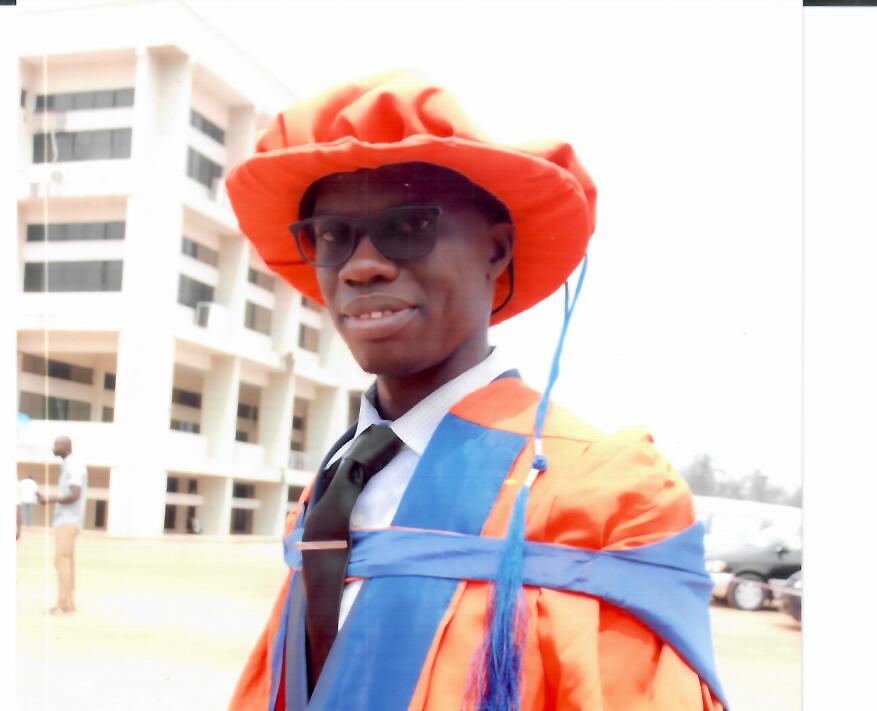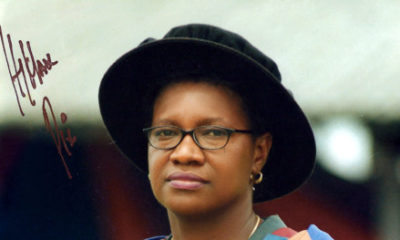Career
Naija Doctorate and Proud: D.M. Jeroh Got His PhD in Solid-State Physics From Nnamdi Azikiwe University, Awka
Getting a Ph.D. in Nigeria is not really an easy drive for those in the sciences. This is because of the lack of adequate materials and laboratories that can serve our research purpose. I remember spending up to three months to import a particular compound from Germany which I needed for my research. This compound was not available in Nigeria at the time.
In July 2018, the BellaNaija Features team decided to take a closer look at academia in Nigeria. We recognize that the current state of our educational system leaves a lot to be desired. However, in spite of all the difficulties, Nigerians still go through the system and manage to excel in their field of studies. Even more commendable are Nigerians who go over and beyond graduate level by attempting and completing post-graduate degrees. It is for this reason that we decided to specially recognize and celebrate people who completed their PhDs in Nigeria. Naija Doctorate & Proud is a celebration of Nigerians who have obtained their doctorate degrees from Nigerian universities. To follow this series, bookmark this page.
It is no mean feat to obtain a Doctorate anywhere in the world, and to do it in Nigeria means you rock!
It is believed that to have a Ph.D. in a science-related course successfully, you have to travel out of the country where their institutions are well-funded, their school environment is absolutely conducive and research can be carried out appropriately.
We are absolutely in awe of Dr. D.M Jeroh, who wanted to prove a point that Nigerians can, not just have their Ph.D. in Nigerian institutions, but can also actually carry out certain types of research right here in Nigeria. Dr. Jeroh’s love for electronics and his eagerness to understand the principles governing the operation of electronics spurred him to study Solid-State Physics at the Nnamdi Azikiwe University, Awka. This has, not just added the title ‘Dr’ to his name, but has also opened doors for him and driven his career growth. Dr. Jeroh is a member of the American Physical Society and a Fellow of the Science Frontier Research Council (FSFRC), United States of America.
We absolutely enjoyed this interview Dr. Jeroh. We hope you enjoy it and get inspired to have your Ph.D. in Nigeria.

So, who is Dr. Jeroh?
I am a native of Urhobo (Orhuwhorun) in Udu Local Government Area of Delta State, Nigeria. I attended Delta State University Abraka (2004-2007) where I obtained a Bachelor of Science (B.Sc) Degree in Physics with a Second Class Honours (Upper-division). Between 2010 and 2012, I attended Nnamdi Azikiwe University, Awka Anambra State where I bagged a Master of Science Degree in Solid-State Physics in August 2012. I registered for my Ph.D. programme in Solid-State Physics in February 2013, also at the Nnamdi Azikiwe University, Awka and eventually had my viva on the 17th of October, 2019. Professionally, I am a member of the American Physical Society. I have also received a provisional offer on the 1st of November, 2019 as a Fellow of the Science Frontier Research Council (FSFRC), United States of America.
Tell us about your area of specialty
My research field is Solid-State Physics. One area of Solid-State Physics is Semiconductor Physics. Semiconductors happen to be the major drive in the electronics industry. My love for electronics and to understand the principles governing the operation of electronics actually spurred me into my current research field. I can also add that the drive to contribute towards improving the current state of the electronics industry also contributed to my interest in this field.
Why did you do decide to do your Ph.D. in Nigeria?
I just wanted to prove a point that we can actually carry out certain types of research here in Nigeria.
And proved you did! How much did it cost to complete the Ph.D. programme at the university you chose?
Well, I may not have a concrete figure, but ranging from the school fees for the years spent, the money involved in the purchase of chemicals and analysis (including the cost of sending samples abroad), I think I spent over 2 million Naira.
Phew, that was surely worth it! Please give a summarized version of your experience getting your Ph.D. in Nigeria
Getting a Ph.D. in Nigeria is not really an easy drive for those in the sciences. This is because of the lack of adequate materials and laboratories that can serve our research purpose. I remember spending up to three months to import a particular compound from Germany which I needed for my research. This compound was not available in Nigeria at the time. Also, after the experimental part of my research, the samples needed to be characterized and analyzed. A number of the equipment needed for this purpose were not available (or not functioning at the time) in Nigeria, as such, the prepared samples were sent to South Africa for further analysis. This really had huge cost implications. And of course, ASUU strike gulped almost two years of my programme. However, I must admit that the experience with my supervisors, lecturers and academic staff (including the past and present head of department) of my institution was extremely great and awesome! I must give kudos to the present Vice-Chancellor of UNIZIK, Prof. Charles Esimone and the Dean, School of Postgraduate Studies, UNIZIK, Prof Philomena Igbokwe for creating an enabling environment to Fastrack the postgraduate programmes and ensure that postgraduate students complete their programmes within the stipulated time. On average, I would say that my Ph.D. experience was inspiring and awesome, to a large extent. I never regretted getting a Ph.D. from UNIZIK!
It’s amazing that you were undeterred by the few challenges. Please walk us through the process of bagging a Ph.D. in Nigeria – from picking a research topic to finding a supervisor, the methodology and thesis…
Picking a research topic wasn’t difficult. I had my Master’s degree in the same field and as such, I already had an insight into the research area. By the time I completed my master’s degree, I already had close ties with a number of Professors. I discovered that my supervisors had so much interest in semiconductor physics, which happens to be the area of interest for me. So, getting both of them to agree on supervising me wasn’t difficult at all. The research was experimental, which involved the synthesis and characterization of semiconductor thin films on a glass substrate using electrostatic spray pyrolysis (a technique employed for this purpose). Thereafter a number of properties of the films were obtained from a number of analyses and discussed accordingly.
Having attained this level of education, do you currently work in academia?
Yes, though on a part-time basis for now. I currently lecture Physics in the Joint Universities Preliminary Examinations Board (JUPEB) programme of the Nnamdi Azikiwe University (UNIZIK), Awka, Anambra State, Nigeria.
Cool. So how has having a doctorate helped you in Nigeria?
A major advantage of having a Ph.D., especially in the academic circle, is getting much respect. When people see that you have a Ph.D. (in my own case; in Physics), they are like, wow! A Ph.D. in Physics? Their respect, especially because of my relatively young age, gives me joy. Another advantage is that it has given me a lot of opportunities to explore. My Ph.D. has added boost to my CV and gives me an edge over Master’s degree holders in terms of job placement.
What major lesson(s) did you learn from the experience?
Well, I learned to be smart and patient and also to strive to achieve success no matter the obstacles encountered.
If you could have done anything differently, what would that be?
Well, I wished I had learned programming language long before now.
Having a Ph.D. is not a walk in the park, what advice would you give someone thinking of getting a Ph.D.?
Such a candidate has to be much focused, think of the right research to be done, get a good supervisor that is vast in one’s field of research and, of course, a good and constant source of income.
What advice would you give people in the Nigerian academic stratosphere on how to improve the quality of the education?
The quality of education in Nigeria can be improved by encouraging fieldwork (or excursions), the use of teaching aids such as projectors and computers, videos and even charts (or pictures).
We absolutely agree! Any final thoughts?
The government at all levels should try to give more priority to education by way of proper funding and infrastructural development and staff welfare. These will go a long way to improve the academic standard in Nigeria.
Thank you so much for sharing your story, Jeroh. We really appreciate you.
BellaNaijarians, if you enjoyed reading this, please share with your friends. If you obtained your PhD from a Nigerian University, we’d love to share your story. Please click HERE to find out how to reach us.




















